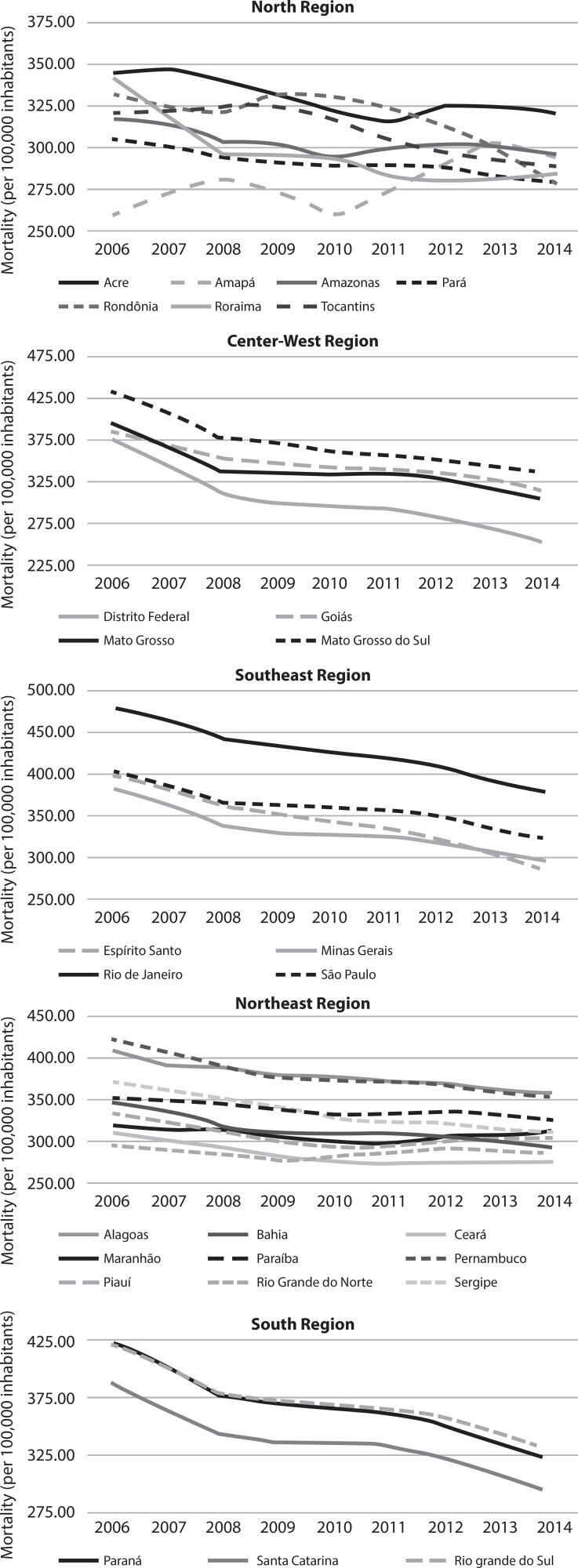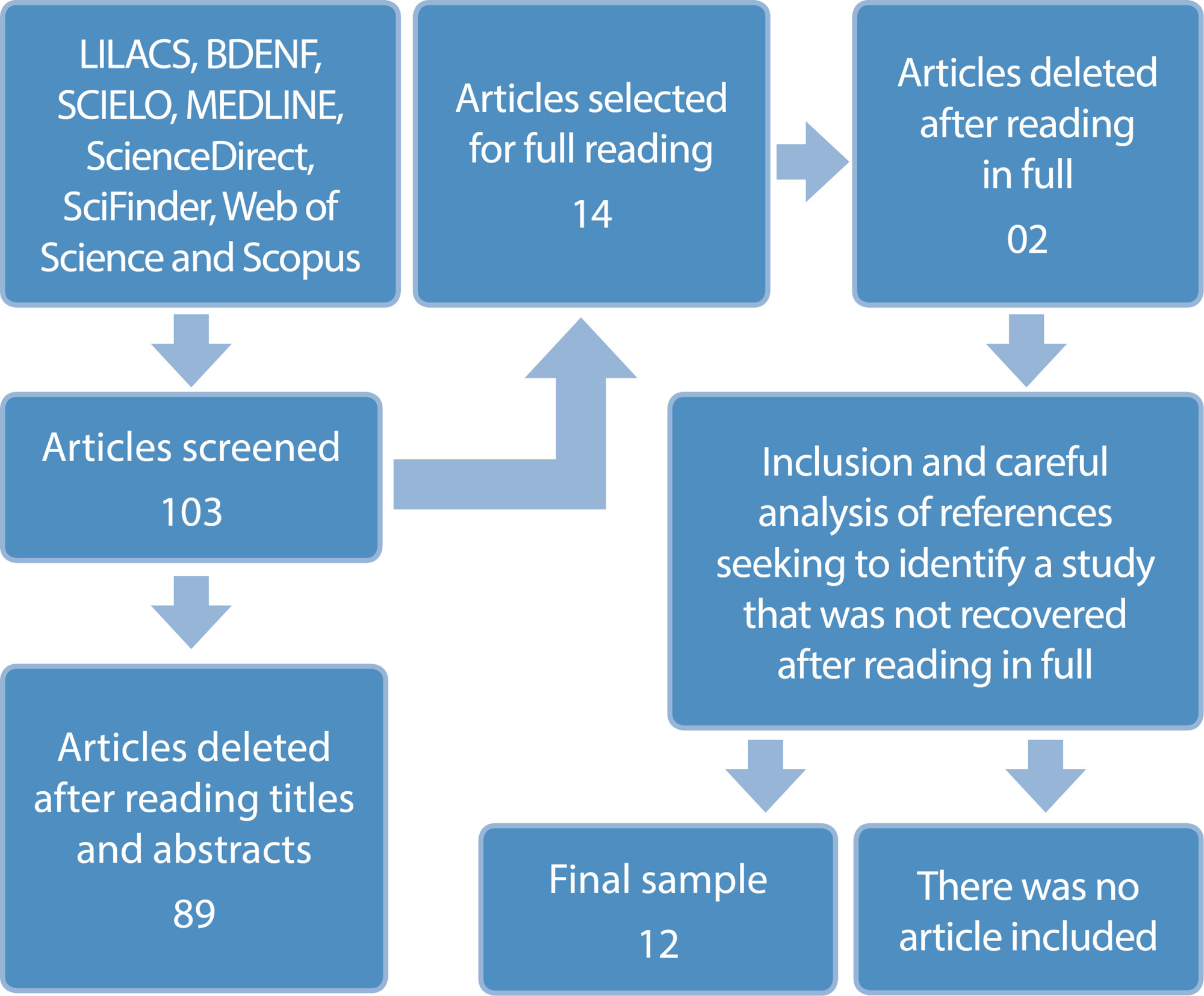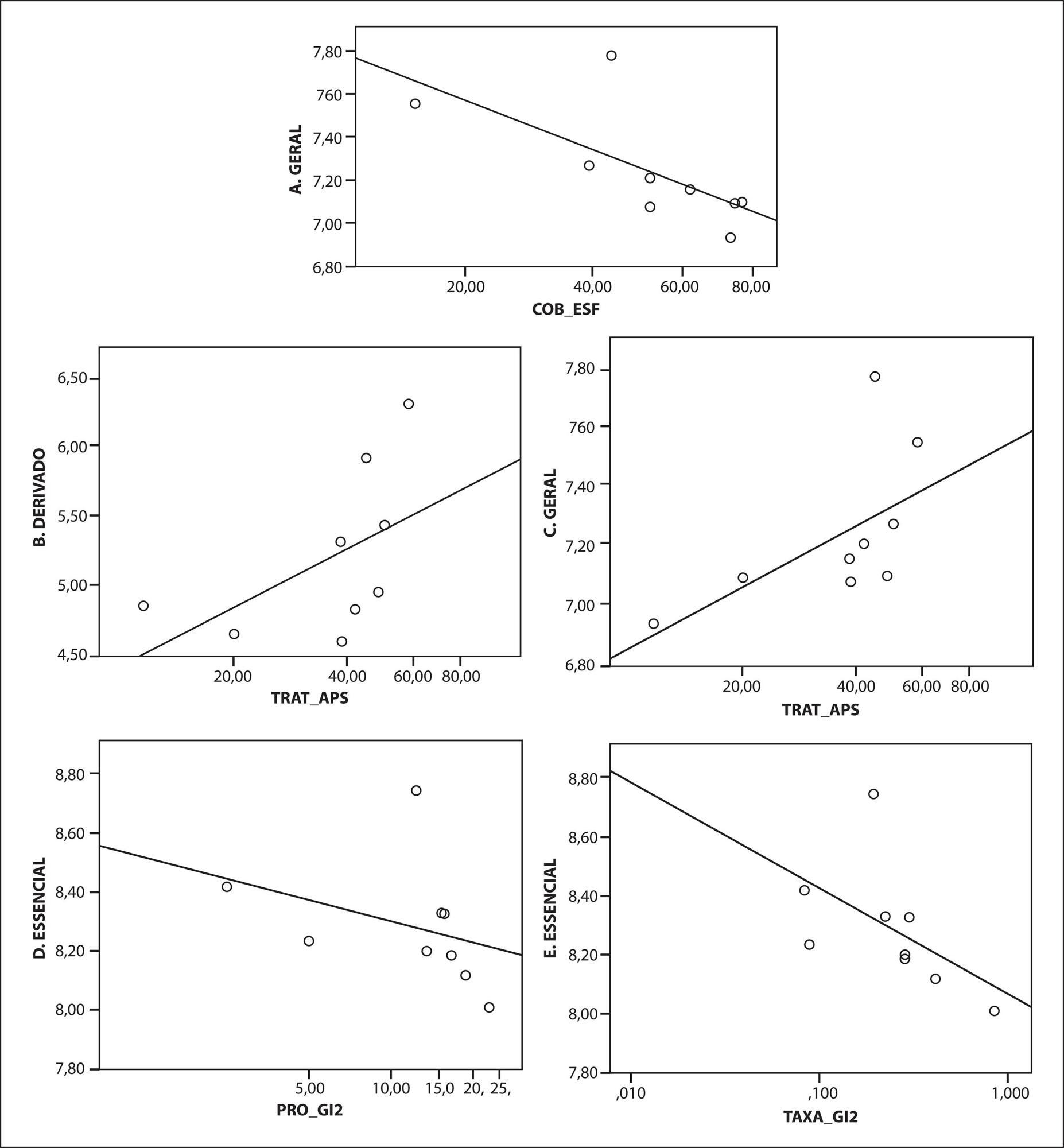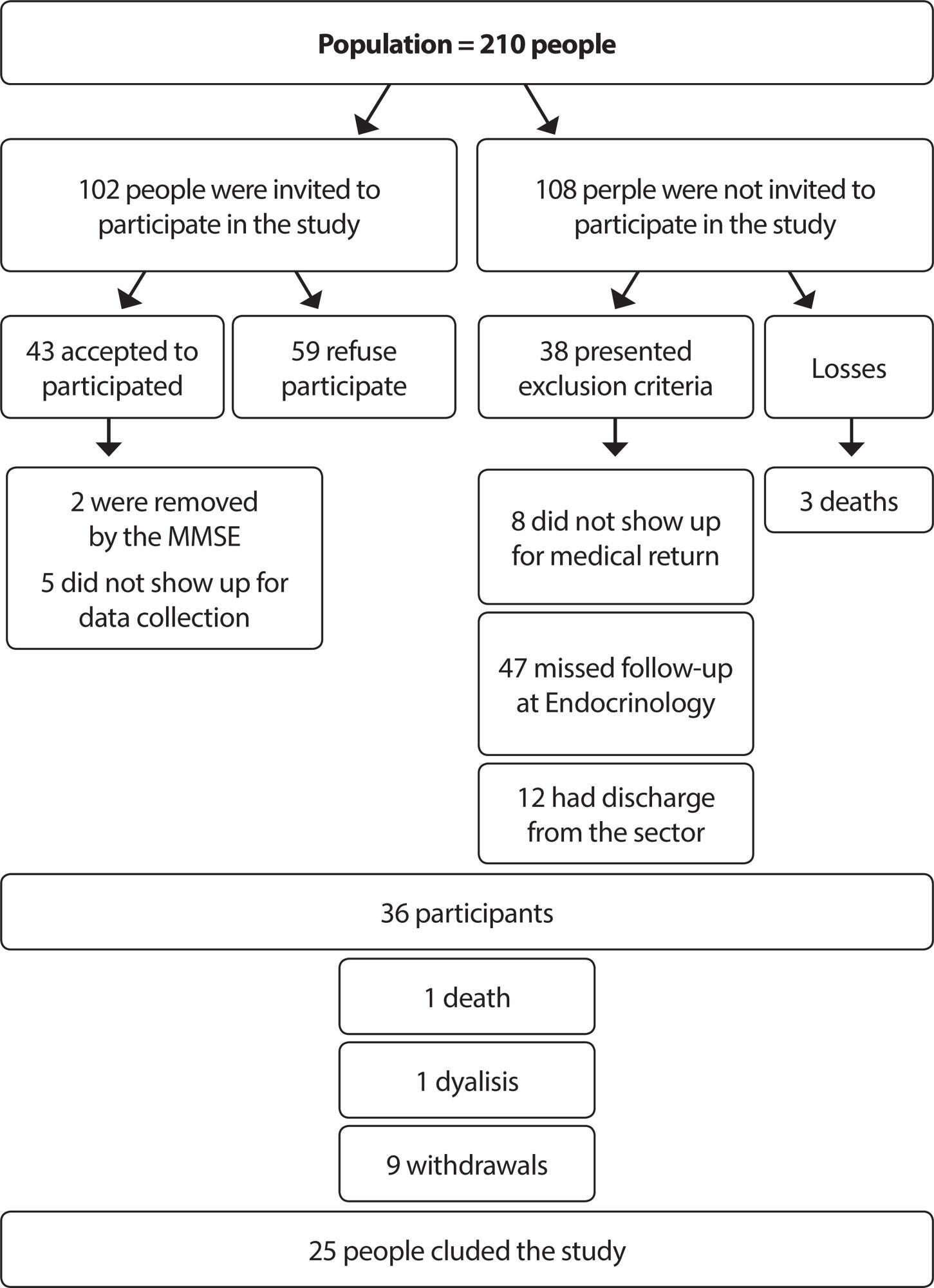-
01-01-2015
Symbolic effects capitalized by nurses from the National Institute of Cancer in Brazil (1980 – 1990)
Revista Brasileira de Enfermagem. 2015;68(2):284-290
Abstract
Symbolic effects capitalized by nurses from the National Institute of Cancer in Brazil (1980 – 1990)
Revista Brasileira de Enfermagem. 2015;68(2):284-290
DOI 10.1590/0034-7167.2015680214i
Views0See moreABSTRACT
Objective:
to describe the strategies of nurses in the National Institute of Cancer to disseminate its scientifi c capital and discuss the symbolic effects capitalized in the fi eld of oncology in the 1980s.
Method:
historical social studies, with primary sources consisting of written documents and oral reports, and as secondary sources, articles and books on the subject, based on the French sociologist Pierre Bourdieu’s concepts of scientifi c capital and habitus.
Results:
it revealed the effective performance of nurses in this Institute on policies of cancer prevention and control and strategies used in the teaching of oncology nursing at the undergraduate level. In conclusion, nursing stands out in this context, through the dissemination of its scientifi c knowledge, as a participant in the construction of a scientifi c fi eld of oncology nursing in Brazil, highlighting the occupation of important social areas.
-
01-01-2015
Perception of nursing undergraduate students on self-aging
Revista Brasileira de Enfermagem. 2015;68(2):278-283
Abstract
Perception of nursing undergraduate students on self-aging
Revista Brasileira de Enfermagem. 2015;68(2):278-283
DOI 10.1590/0034-7167.2015680213i
Views1See moreABSTRACT
Objective:
to analyze the perceptions of nursing undergraduate students on their self-aging process.
Method:
qualitative study carried out between August and September, 2011 with 18 nursing undergraduate students of a public university in Salvador, Bahia. The interviews were analyzed by means of the Content Analysis method.
Results:
the following thematic concept was apprehended: Perceptions of nursing undergraduates on their self-aging, which generated two subcategories: A) The “don’t think about it” process; B) The context infl uencing the process.
Conclusion:
undergraduates reveal that the aging process is an intrinsic factor to human development. Family ties, spirituality and physical activity would be key mechanisms toward active aging. However, students also reported that their accelerated and stressed social lifestyles led to inadequate habits, such as the consumption of fast food and alcohol, which become negative infl uences in their aging process.
-
01-01-2015
Non-conventional technologies for data collection in Brazilian dissertations and theses
Revista Brasileira de Enfermagem. 2015;68(2):269-277
Abstract
Non-conventional technologies for data collection in Brazilian dissertations and theses
Revista Brasileira de Enfermagem. 2015;68(2):269-277
DOI 10.1590/0034-7167.2015680212i
Views0See moreABSTRACT
Objective:
to characterize non-conventional technologies used for data collection of dissertations and theses available in the Catalog of Theses and Dissertations (CEPEn) of the Brazilian Nursing Association (ABEn).
Method:
this is a documentary research, whose data were collected in the catalogs of theses and dissertations available at the ABEn website, from Volumes XIX to XXI. The indicators collected were: academic level; educational institution; year; qualification of the author; setting; non-conventional technology used; type of technology; association with conventional techniques; methodological design; benefi ts and methodological limitations.
Results:
from a total of 6346 studies, only 121 (1.91%) used non-conventional technologies for data collection, representing the fi nal sample of the study.
Conclusion:
it is concluded that Brazilian Nursing researches still need methodological innovations for data collection.

-
01-01-2015
Content analysis of a technology to the nursing diagnostic reasoning
Revista Brasileira de Enfermagem. 2015;68(2):261-268
Abstract
Content analysis of a technology to the nursing diagnostic reasoning
Revista Brasileira de Enfermagem. 2015;68(2):261-268
DOI 10.1590/0034-7167.2015680211i
Views0See moreABSTRACT
Objective:
to undergo a content analysis of a metacognitive strategy of indirect assessment in the pre-encounter with the client.
Method:
methodological study. Agreement and inter-rater reliability index for the criteria: relevance, adequacy, clarity, conciseness and accuracy of a technology to the nursing diagnosis reasoning for novices through an electronic form. The sample consisted of 13 raters. Data were analyzed using descriptive statistics.
Results:
high agreement and inter-rater reliability for 85 items related to data collection stage and the strategy description. Only fi ve items did not reach the validation criteria and must be rewritten.
Conclusion:
indirect assessment of the pre-encounter is relevant to the diagnostic reasoning process, being possible to develop competencies and diagnostic skills in the novice through strategies, proposals on innovative technology in the form of a diagram.
-
01-01-2015
Manual for monitoring the quality of nursing home care records
Revista Brasileira de Enfermagem. 2015;68(2):253-260
Abstract
Manual for monitoring the quality of nursing home care records
Revista Brasileira de Enfermagem. 2015;68(2):253-260
DOI 10.1590/0034-7167.2015680210i
Views0See moreABSTRACT
Objective:
to build and validate an instrument aimed at monitoring the quality of nursing records in the Home Care Program (HCP) of a university hospital.
Method:
methodological study involving the elaboration of a manual, whose content was later submitted to six experts for validation, reaching a ≥ 80% consensus. The data collection process was carried out in 2012 by means of a questionnaire comprised of the following issues: nursing evolution, nursing diagnosis, and nursing prescription, and standards for the nursing team recommended by the Regional Nursing Council of São Paulo and by the assessed institution. Manual items were judged according to the following variables: relevance, pertinence, clarity and simplicity.
Results:
of the 39 propositions, 100% achieved ≥ 80% agreement in the relevance, pertinence and clarity variables; 92.3% in the simplicity variable. Sleep/rest, Mobility and Check-out variables did not reach a favorable minimum consensus in the prescribed activities and were improved following suggestions from the experts.
Conclusion:
we believe that the instrument will enable the improvement of the HCP’s work process.
-
01-01-2015
Vulnerability of families of elderly citizens cared for by the Family Health Strategy
Revista Brasileira de Enfermagem. 2015;68(2):244-252
Abstract
Vulnerability of families of elderly citizens cared for by the Family Health Strategy
Revista Brasileira de Enfermagem. 2015;68(2):244-252
DOI 10.1590/0034-7167.2015680209i
Views0See moreABSTRACT
Objective:
the present descriptive, exploratory, cross-sectional study aimed to identify the vulnerability of families of elderly citizens cared for by the Family Health Strategy (FHS).
Method:
the research employed home interviews and was developed with a sample of 500 families of aged people cared for by 32 FHS teams in the city of Dourados, MS, Brazil. The Family Development Index (FDI) was adapted in order to classify the families according to their degree of vulnerability.
Results:
the results revealed the presence of multigenerational families with low educational levels among individuals over the age of 20 and high illiteracy rates among elderly citizens. There were 403 families whose vulnerability was acceptable, 95 in severe vulnerability, and two families in a condition of very severe vulnerability. The most critical dimensions of the FDI were the access to knowledge and to work.
Conclusion:
the study identifi ed that there is still a need for further investments that can assist these aged people and their families in the Primary Health Care.
-
01-01-2015
The work in prison: reflections on the health of prison officers
Revista Brasileira de Enfermagem. 2015;68(2):235-243
Abstract
The work in prison: reflections on the health of prison officers
Revista Brasileira de Enfermagem. 2015;68(2):235-243
DOI 10.1590/0034-7167.2015680208i
Views0See moreABSTRACT
Objective:
to understand the working conditions of prison offi cers and the repercutions of labor activity on their health.
Method:
qualitative and descriptive research. Data were collected through open interviews with the prison offi cers of a regional prision and the speeches were submitted to content analysis.
Results:
the results showed unsatisfactory working conditions due to poor material resources and neglect of governmental regarding rehabilitation of convicts, resulting in workers’ exposure to psychosocial risks, dissatisfaction, and emotional distress.
Conclusion:
investments on the security of workers may contribute to their health promotion.
-
01-01-2015
Mother recognition in the Neonatal Intensive Care Unit
Revista Brasileira de Enfermagem. 2015;68(2):228-234
Abstract
Mother recognition in the Neonatal Intensive Care Unit
Revista Brasileira de Enfermagem. 2015;68(2):228-234
DOI 10.1590/0034-7167.2015680207i
Views0See moreABSTRACT
Objective:
analyze the maternal experience in a neonatal intensive care unit, focusing on relations of recognition.
Method:
a qualitative study, built on the perspective of Gadamer’s hermeneutics, based on Honneth’s concept of recognition. In-depth interviews were conducted with 10 mothers of children admitted to a neonatal intensive care unit.
Results:
failures were reported in the process of mother recognition in the unit, with consequent feelings of insecurity and obligation to child care, resulting in fragility of self-esteem.
Conclusion:
interactions with health professionals in the NICU and its standards and protocols cause vulnerabilities and affect maternal recognition and autonomy.
-
06-28-2021
Baby-Friendly Hospital Initiative for Neonatal Wards: impact on breastfeeding practices among preterm infants
Revista Brasileira de Enfermagem. 2021;74:e20200909
Abstract
Baby-Friendly Hospital Initiative for Neonatal Wards: impact on breastfeeding practices among preterm infants
Revista Brasileira de Enfermagem. 2021;74:e20200909
DOI 10.1590/0034-7167-2020-0909
Views0See moreABSTRACT
Objective:
to assess breastfeeding support practices for preterm infants at two Baby-Friendly hospitals in southeastern Brazil, comparing the effect of implementing the guidelines for Baby-Friendly Hospital Initiative for Neonatal wards.
Methods:
a quasi-experimental study, pre- and post-intervention with control. Implementation of this initiative in the intervention hospital using Knowledge Translation. Data collection on compliance with the adapted Ten Steps, Three Guiding Principles and the Code before and after the intervention was carried out via interviews with mothers of preterm babies and professionals, unit observation and documentary analysis in the intervention and control hospitals. Intra-intergroup comparison was performed.
Results:
increases in global compliance with the Three Principles, Ten Steps, the Code, partial compliance with each Principle and in most Steps was greater in the intervention hospital. Conclusion: this initiative improved practices related to breastfeeding in the intervention hospital, demonstrating the potential to improve care and breastfeeding in neonatal wards.

-
REFLECTION04-22-2020
Reflections on equity and its applicability to the nursing work process
Revista Brasileira de Enfermagem. 2020;73(3):e20190783
Abstract
REFLECTIONReflections on equity and its applicability to the nursing work process
Revista Brasileira de Enfermagem. 2020;73(3):e20190783
DOI 10.1590/0034-7167-2019-0783
Views0See moreABSTRACT
Objectives:
to reflect on the principle of equity from the perspective of social justice and its applicability in the dimensions of the nursing work process.
Methods:
theoretical essay on the challenges for the practice with equity in the dimensions of the Nursing work process: teaching, care, research, political participation and administration.
Results:
the principle of equity should: in education be transversal in the training of future professionals; in assistance to occur without privilege or discrimination, treating the unequal unequally and the equals equally; in research be the target in the creation of new knowledge; in political participation to count on the contribution of social movements; and in the administration to count on the creation of specific executable policies.
Final Considerations:
there are still inequalities in access to services by part of the Brazilian population. Nursing should promote in its work process the implementation of equity promotion policies with a view to social justice.
-
ORIGINAL ARTICLE10-21-2019
Premature mortality caused by the main chronic noncommunicable diseases in the Brazilian states
Revista Brasileira de Enfermagem. 2019;72(6):1588-1594
Abstract
ORIGINAL ARTICLEPremature mortality caused by the main chronic noncommunicable diseases in the Brazilian states
Revista Brasileira de Enfermagem. 2019;72(6):1588-1594
DOI 10.1590/0034-7167-2018-0701
Views0See moreABSTRACT
Objective:
To verify the variation of the premature mortality rate caused the group of the main chronic noncommunicable diseases.
Method:
This is a time-series ecological study, which used secondary data of the Mortality Information System, from 2006 to 2014, from the 26 federal units and from the Federal District. Deaths caused by circulatory system diseases, cancer, diabetes and chronic respiratory diseases were included. The trend of adjusted mortality rate was analyzed by segmented linear regression.
Results:
Premature mortality tended to be reduced in most states, except for Maranhão and Rio Grande do Norte, which presented a stable premature mortality rate. Bahia, Pernambuco, Sergipe, Roraima and all the states from the South, Southeast and Central-West Regions reached the goal of reducing 2% per year in premature mortality caused by main diseases.
Conclusion:
Most of the states showed a reduced mortality rate and are reaching the proposed target.

-
ORIGINAL ARTICLE12-05-2019
Falls of elderly people living in rural areas: prevalence and associated factors
Revista Brasileira de Enfermagem. 2019;72:177-183
Abstract
ORIGINAL ARTICLEFalls of elderly people living in rural areas: prevalence and associated factors
Revista Brasileira de Enfermagem. 2019;72:177-183
DOI 10.1590/0034-7167-2018-0460
Views0See moreABSTRACT
Objective:
to identify the prevalence and factors associated with falls in the elderly population living in rural areas.
Method:
this is a cross-sectional study, carried out in 2014, with 820 older adults recorded in the Family Health Strategy (Estratégia Saúde da Família). The association between the reporting of falls in 12 months and their associated factors was verified by the Chi-square and Fischer’s exact tests and by multivariate logistic regression analysis.
Results:
the majority of the sample was female (56.1%), white (90.2%) and aged 60-69 years (54.9%). The prevalence of falls was 27.9%, and being female, hypertensive and diabetic was associated to falls.
Conclusion:
it is the responsibility of health professionals to have a closer look at the elderly who have these chronic diseases, especially within the scope of the Family Health Strategy, which works longitudinally with these patients, in addition to improving nursing care aimed at this population.
-
REVIEW05-28-2021
Biological activities: anti-infectious, antioxidant and healing of the vegetable species Jatropha multifida
Revista Brasileira de Enfermagem. 2021;74(2):e20200451
Abstract
REVIEWBiological activities: anti-infectious, antioxidant and healing of the vegetable species Jatropha multifida
Revista Brasileira de Enfermagem. 2021;74(2):e20200451
DOI 10.1590/0034-7167-2020-0451
Views0See moreABSTRACT
Objective:
to investigate the biological activities of interest to the health of Jatropha multifida plant species in published scientific literature.
Methods:
this is an integrative review, with searches between May and June 2019, using the descriptors, combined through the Boolean operator AND, Jatropha multifida, anti-infective agents, wound healing, cytotoxicity and antioxidants, in LILACS, BDENF, MEDLINE, SciFinder, Web of Science and Scopus databases and in the virtual libraries SciELO and ScienceDirect.
Results:
twelve publications were retrieved that showed nine biological activities. The antioxidant activity was reported in 04 (33.33%) studies; antimicrobial and anticancer, addressed by 03 (25%) and 02 (16.66%); anti-inflammatory, anti-melanin deposition, healing, antiophidic, purgative and anti-influenza, seen in 01 (8.33%) each.
Final considerations:
although scarce, the published scientific production highlights the biological potential of J. multifida and supports the need for further studies.

-
ORIGINAL ARTICLE06-01-2020
Primary care quality and its effects on leprosy monitoring indicators
Revista Brasileira de Enfermagem. 2020;73(4):e20190038
Abstract
ORIGINAL ARTICLEPrimary care quality and its effects on leprosy monitoring indicators
Revista Brasileira de Enfermagem. 2020;73(4):e20190038
DOI 10.1590/0034-7167-2019-0038
Views0See moreABSTRACT
Objectives:
to evaluate the quality of primary care in leprosy control actions, to correlate effects on monitoring indicators.
Methods:
a cross-sectional study, conducted in Belo Horizonte, from July to September 2014. Interviews with 408 professionals were conducted through the application of a tool that assesses attributes of primary care in leprosy control actions, and monitoring indicators were calculated. Spearman correlation was used, significance level p < 0.05.
Results:
the overall score correlated with the percentage of cases treated in primary care and of family health staff coverage. The derived score correlated with the percentage of cases treated in primary care, and the essential score correlated with the proportion and rate of cases diagnosed, with grade 2 physical disability.
Conclusions:
the quality of leprosy control actions performed by primary care professionals produces impacts on health indicators, and developing strategies consistent with the reality of the territory is necessary.

-
ORIGINAL ARTICLE10-21-2019
Education in Diabetes Mellitus for blood glucose self-monitoring: a quasi-experimental study
Revista Brasileira de Enfermagem. 2019;72(6):1601-1608
Abstract
ORIGINAL ARTICLEEducation in Diabetes Mellitus for blood glucose self-monitoring: a quasi-experimental study
Revista Brasileira de Enfermagem. 2019;72(6):1601-1608
DOI 10.1590/0034-7167-2018-0731
Views0See moreABSTRACT
Objective:
to evaluate the contributions of an educational program for capillary blood glucose self-monitoring.
Method:
a quasi-experimental study performed in an outpatient unit of a tertiary health care service in a sample of 25 people with Type 2 Diabetes Mellitus, from July 2016 to December 2017, developed through interactive tools for care with capillary blood glucose self-monitoring.
Results:
among the items of capillary blood glucose self-monitoring that showed improvement after participation in the educational program, the most noteworthy are the “postprandial blood glucose values” (p=0.0039), “Interpretation of capillary blood glucose results with meals and medications” (p=0.0156), “recognition of the ‘weakness’ symptom for hyperglycemia” (p=0.0386) and “administration of medications correctly” for hyperglycemia prevention (p=0.0063).
Conclusion:
the study made it possible to recognize the main characteristics of blood glucose self-monitoring that may contribute to the care for the person with diabetes.

-
ORIGINAL ARTICLE06-01-2020
Nursing entrepreneur care in social inequity contexts
Revista Brasileira de Enfermagem. 2020;73(4):e20190014
Abstract
ORIGINAL ARTICLENursing entrepreneur care in social inequity contexts
Revista Brasileira de Enfermagem. 2020;73(4):e20190014
DOI 10.1590/0034-7167-2019-0014
Views0See moreABSTRACT
Objectives:
to identify emancipatory strategies to strengthen the social protagonism of recyclable materials collectors in the light of entrepreneurial Nursing care.
Methods:
qualitative study carried out in two stages: field approach from healthcare interventions in a Recycling Materials Association, and individual interviews conducted between October and December 2018.
Results:
the analysis resulted in three thematic categories: Social contribution of recyclable materials collectors; From the assistentialist perception to entrepreneurial Nursing care; Emancipatory strategies of recycling work.
Final Considerations:
the emancipatory strategies to strengthen the social protagonism of recyclable materials collectors in the light of entrepreneurial Nursing care are related to the appreciation, recognition and enhancement of social work that has been already performed by these professionals, and to the creation of spaces for the socialization of experiences, expectations and perspectives.
Search
Search in:
Nuvem de Tags
Adolescente (85) Atenção Primária à Saúde (239) COVID-19 (91) Criança (91) Cuidados de Enfermagem (269) Educação em Enfermagem (151) Educação em Saúde (139) Enfermagem (930) Enfermagem Pediátrica (86) Estudantes de Enfermagem (77) Estudos de Validação (131) Família (87) Idoso (208) Promoção da Saúde (99) Qualidade de Vida (104) Saúde do Trabalhador (86) Saúde Mental (145) Saúde Pública (82) Segurança do Paciente (150) Tecnologia Educacional (100)



